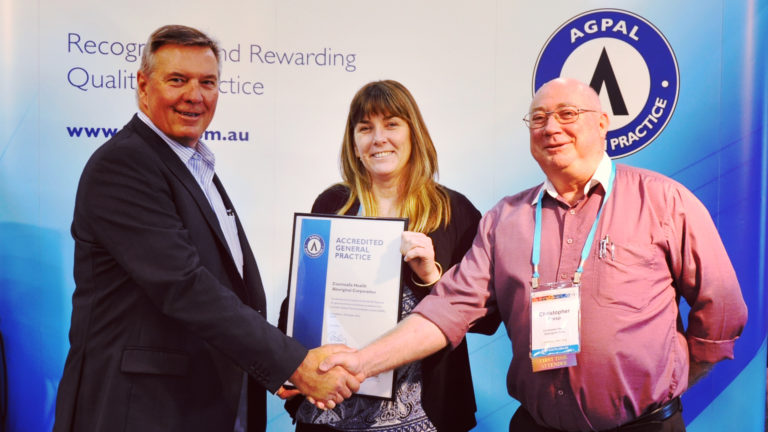Practices in Focus
Coomealla Health Aboriginal Corporation

Coomealla Health Aboriginal Corporation is a fantastic example of a medical practice dedicated to providing high quality health care to Aboriginal and Torres Strait Islander Community members.
Coomealla Health Aboriginal Corporation is an Aboriginal Community Controlled Health Organisation working closely with Aboriginal Health and Medical Research Council (AH&MRC), the Bila Muuji regional representative consortium [health planning and development forum] and the National Aboriginal Community Controlled Health Organisation (NACCHO) to deliver holistic, comprehensive and culturally appropriate health care controlled by local community members.
For over 20 years, the practice has proudly operated as an Aboriginal Community Controlled Health Service (ACCHS), a body representing the Indigenous community of the Wentworth Shire to encourage and improve the health and wellbeing of Aboriginal, Torres Strait Islanders and the wider community.
Interview
To extend their quality offering to patients and continue government funding, the practice underwent and achieved AGPAL accreditation in late 2014. The AGPAL Team spoke with Christopher A.J Cresp, CEO, Coomealla Health Aboriginal Corporation to see how they went.
AGPAL Team: The Coomealla Health Aboriginal Corporation offers a comprehensive range of health and wellbeing services to its clientele. Can you tell us about Coomealla’s background and the services that you provide to your local community?
Christopher: Coomealla Health Aboriginal Health started over 20 years ago when a group of Aboriginal Women decided to do something about the declining health care of Aboriginal people in the Coomealla region in far west NSW. With their ongoing dedication and commitment, the practice has now grown into a successful Community Controlled Health Service catering to the Aboriginal and general population for this region.
The concept of the Community Controlled Health Service approach ensures we can offer culturally appropriate practises to meet the needs of our clientele.
Our service offerings extend from general practice services to mental health, sexual health, maternal and children’s health and men’s and women’s health, allied health specialties, optometry and hearing services. Our centre also offers a gymnasium, community based health education services, triage, treatment and transport of ill clients requiring additional medical and health interventions.
AGPAL Team: What does accreditation mean to Coomealla Health Aboriginal Corporation?
Christopher: Accreditation has created a true sense of pride and achievement for our organisation especially when we can be measured against similar practices that have also undergone and received accreditation. Being recognised with accreditation means we can deliver a standardised level of care which further allows greater flexibility of staff movements between clinics where the same industry standards apply.
Accreditation has also given us the ability to generate an increasing level of Medicare income to support the expansion of our services. With the move of government away from the 100% funding model to a shared arrangement this means that practices like this one have to add income to the budget base to continue to deliver services to our clients.
AGPAL Team: How did you engage your staff through the accreditation process?
Christopher: Initially this was difficult [scary was the phrase from staff] as the staff members who were responsible for the previous accreditation cycle were no longer with our service. We found we had initial reluctance from staff to be involved as they had not been involved in the previous process. Through meeting with staff and explaining very clearly the process and information required [with assistance from AGPAL] these fears were allayed. We set-up a committee, which allowed for consultative planning and the commencement of the accreditation process.
The committee [or team] were led very ably by our Registered Nurse who had numerous meetings with staff and senior management on the progress of our accreditation and assessment. Input was sought from numerous staff which meant that we were able to meet the requirements outlined within the self-assessment process and the follow up remediation required.
AGPAL Team: Do you have any hints or tips to pass on to other Aboriginal Health and general practices to assist them throughout the accreditation process?
Christopher: It’s vital to have a well-developed understanding of what the accreditation process involves and the ultimate benefits for the organisation. The AGPAL team is able to assist with any questions or confusions, so my advice is to ‘just ask them’.
AGPAL Team: What quality improvements have been implemented since you commenced your accreditation journey?
Christopher: The whole organisation has benefitted from the accreditation process. With the move towards complying with the RACGP Standards there was the need to develop each and every department of our organisation. All of our departments have benefitted by reaching the Standards requirements.
Educational programs have been put into place to ensure suitably qualified staff have the ability to add or subtract from the policies and procedures that focus and direct the organisation. Systems and processes have been enhanced and maintained which is designed to make the client journey more efficient and meaningful.




